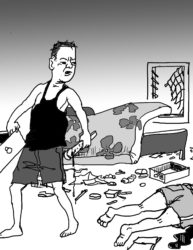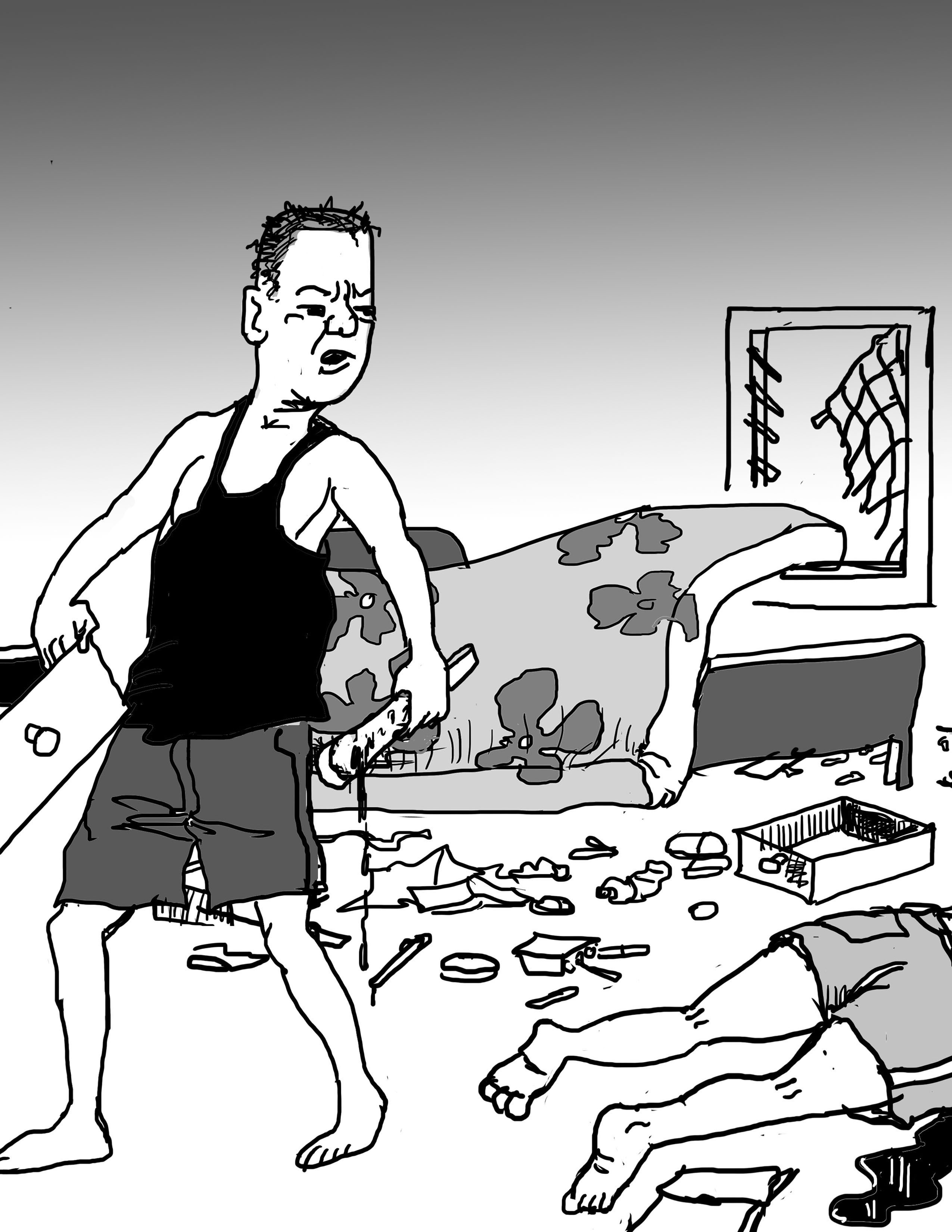After the deed had been done they were unable to think straight, to fashion a plan to extricate themselves from what they had done. The consequences lay before them like an open book, an elderly man wheezing what little life he still had in him away, blood still flowing steadily from two deep wounds in his chest. They had gone to his home to rob him. After he had recognized one of them and called his name they had reasoned that they had to kill him.
Jomo was Mr. Samuels’ neighbour, two houses removed. It was he who had planned the crime. He used to observe Mr. Samuels collecting money from Mr. Kandasammy just before the businessman’s truck pulled off laden with agricultural produce from the Samuels’ farm. Afterwards, the farmer would clean the mud left on the bridge after the wheelbarrow had crossed over it several times laden with ground provision. He would then retire until the next day when he would make a trip to the bank to do a deposit.
It was only when he was staring at Mr. Samuels gasping vainly for breath that it struck Jomo that his involvement in the crime rendered him guilty of, among other things, the grossest ingratitude. He remembered that the farm had provided many a meal for his mother’s pot, that it had, frequently, meant the difference between hunger and a bellyful for himself and his two sisters. In Land of Plenty, Mr. Samuels had a reputation for generosity.
 The three boys – Jomo, Marcus and Saul – who had gone to Mr. Samuels’ house and robbed and murdered him had all been expelled from school at the same time. Jomo, the youngest, was fifteen. The other two had just turned sixteen. The trio had set upon a teacher who had reprimanded them for bullying two younger boys. They had beaten him badly. The hapless teacher, a middle-aged man named Mr. De Weever, had been taken to hospital with a broken arm.
The three boys – Jomo, Marcus and Saul – who had gone to Mr. Samuels’ house and robbed and murdered him had all been expelled from school at the same time. Jomo, the youngest, was fifteen. The other two had just turned sixteen. The trio had set upon a teacher who had reprimanded them for bullying two younger boys. They had beaten him badly. The hapless teacher, a middle-aged man named Mr. De Weever, had been taken to hospital with a broken arm.
The attack on Mr. De Weever had been one of a series of unsavory incidents in which the boys had been involved in school. The authorities had decided that their removal from the rest of the school population was best for all concerned. Their expulsion had been preceded by a series of meetings between the Head Teacher, Mrs. Barnes, and the parents of the three boys. A near confrontation during what turned out to be the final meeting ended in the police being summoned to escort the parents and the boys off the school premises.
The boys’ idleness occasioned by their expulsion from school meant that they slipped swiftly into a routine of undesirable activities. In the village they quickly established a reputation as petty thieves. They had even been implicated in a break-and-enter that targeted Mr. Sugrim’s Hardware Store. The police, however, had been forced to release them on account of a lack of any hard evidence.
Mr. Samuels’ death later in the day created a hum in Land of Plenty. Neighbors gathered in front of the dead man’s home, the attendant gossip immersing in speculation as to who may have done the deed.
Jomo, Marcus and Saul had figured that it was no more than a question of lying low for a while. That is how it had been with other incidents. After a decent passage of time the villagers would forget the incident and the boys would quietly reintegrate. It was not the sort of environment in which people took petty thievery seriously. An interlude of gossip and speculation would be followed by a swift moving on to the next item on people’s agenda.
Murder, however, was a different matter. The enormity of the crime meant that public speculation was more intense. Besides, there was the matter of the involvement of the police, a circumstance that would not customarily arise in instances of lesser offences.
Angus Saunders was nineteen, just four years older than Jomo. The two young mean had both grown up in Land of Plenty. Their lives, however, had moved in diametrically opposite directions. After he had done his CXC’s Angus had applied for and been accepted in the Guyana Police Force. He had been offered and had declined a place on the Cadet Officer training programme on the basis of his CXC results. His line of reasoning was that he was likely to become a more thorough policeman if he chose the option of ‘going through the ranks’ so to speak.
After news of Mr. Samuels’ death had brought a throng of villagers to his front gate Constable Saunders and a colleague, Lance Corporal Steffon Bacchus, had been despatched to the location. They had been tasked with simply mingling with the crowd, ‘catching the vibes’ so to speak and contemplating the speculation. Angus knew all of the boys well. His own home was across the street from where Jomo lived and over time he had made a study of their habits. Milling around with the crowd outside Mr. Samuels’ house it had not taken him long to discover that Jomo, Marcus and Saul were once again absent from the village at the height of an investigation into a crime.
Later on, back at the Police Station, he pointed the pattern out to Sergeant Richardson. The more experienced policeman pondered Constable Saunders’ observation then set it aside. Somehow, while he had long come to the conclusion that the trio would eventually end up in prison it never occurred to him that the crime might be murder.
Jomo, Saul and Marcus had fled the village in blind panic. They had headed in the direction of Charity armed with a half-baked plan to disappear into the Pomeroon river. They had divided the money that they had taken from Mr. Samuels’ home among themselves and had quietly boarded a minibus for their intended destination.
Joshua De Weever had decided that the commotion in the village arising out of Mr. Samuels’ killing would not distract him from his mission that day. Since his beating at the hands of the three boys he had lost his appetite for teaching and had chosen the option of early retirement. Idleness had since proven to be considerable discomfort and he had taken to traveling to Charity periodically to spend time with his married son, his wife and their two granddaughters.
As it happened De Weever was sitting in one of the rows of back seats of the Charity-bound bus when the trio entered and sat in the seats directly in front of him. He took one look at them and smelt a huge, stinking rat!
It was not that news of Mr. Samuels’ murder had left Mr. De Weever unaffected. After retirement, however, he had become a considerable introvert, minding his own business and not bothering to feel or care much about what was going on in the village. He came to see events around him as a microcosm of a wider national problem of social decay, a lowering of standards, the erosion of authority, of betrayal by politicians who promised much but, in the final analysis, delivered sorry little. He had arrived at a juncture where he had become thoroughly intimidated by the frightening assertiveness of the younger generation, the breakdown of the home and school systems and the tenuous hold which the forces of law and order had on the society. Once the retired teacher had entered that state of mind he tended to care less about everything, save and except his two grand daughters.
De Weever’s long-cultivated indifference, however, was not sufficient to suppress the alarm bells that went off in his head. His knowledge of the boys’ reputation coupled with his awareness of Mr. Samuels’ killing meant that he could put their presence on the Charity-bound bus into some sort of context. Besides, loud, aggressive and menacing as they usually were, the three boys, sitting on the bus, all bore furtive and uncomfortable expressions, perspiring visibly on a day when a brisk breeze was wafting through the moving vehicle. The expressions on their faces suggested that they had a fervent desire to become invisible.
De Weever sat quietly, contemplating what he thought of as the product of a gradual and terrible erosion of the Guyanese society. The boys had been victims of poor parenting and a community, a school system and a wider society that had all failed them miserably. Long before this day the now retired teacher had peered into his crystal ball and seen the future of the trio who were on their way to becoming fugitives from justice. They had been failed by a society that had paid insufficient attention to that particular generation. He had long surmised that the boys, and thousands of others like them, were heading for Hell, wherever that might be.
It took ages for the bus to arrive at Charity. During the journey the boys grew increasingly uncomfortable. There was no longer any doubt in Mr. De Weever’s mind that they were preoccupied with running from something. It did not take a Rocket Scientist, he reasoned, to work out that there was a link between their flight from Land of Plenty and Mr. Samuels’ death.
Sitting on the minibus, heading for Charity Joshua De Weever knew that he was experiencing a life-changing moment. The sense of social withdrawal that he had felt since being assaulted by the three boys sitting in front of him and by his subsequent retirement from teaching appeared at that moment to be evaporating into a sudden, long-forgotten cloud of citizens’ responsibility. When the bus finally arrived at Charity the boys disembarked quickly and walked briskly in the direction of the market. De Weever reached for his cellphone and dialled his nephew Joshua Saunders’ number.
He knew that Saunders had acted with despatch when, less than ten minutes later, he saw four armed police ranks literally running into Charity Market, brushing shoppers aside as they went. They caught the boys without a great deal of trouble, roughed them up and came up with their separate ‘stashes’ of Mr. Samuels’ money.
The crowd that had gathered to watch the boys being escorted back to the Police Station bore puzzled expressions on their faces. They had no clue as to what they were witnessing. De Weever was standing outside the market. Somehow, the knowledge that he was probably the only person there who could put the dots together made him feel better.
The Guyana Review seeks to encourage young, amateur creative writers to submit short stories for the newspaper’s Writers’ Column. Stories will be published based on the editor’s choices and on available space. Submissions must be accompanied by brief biodata and a photograph of the writer.





